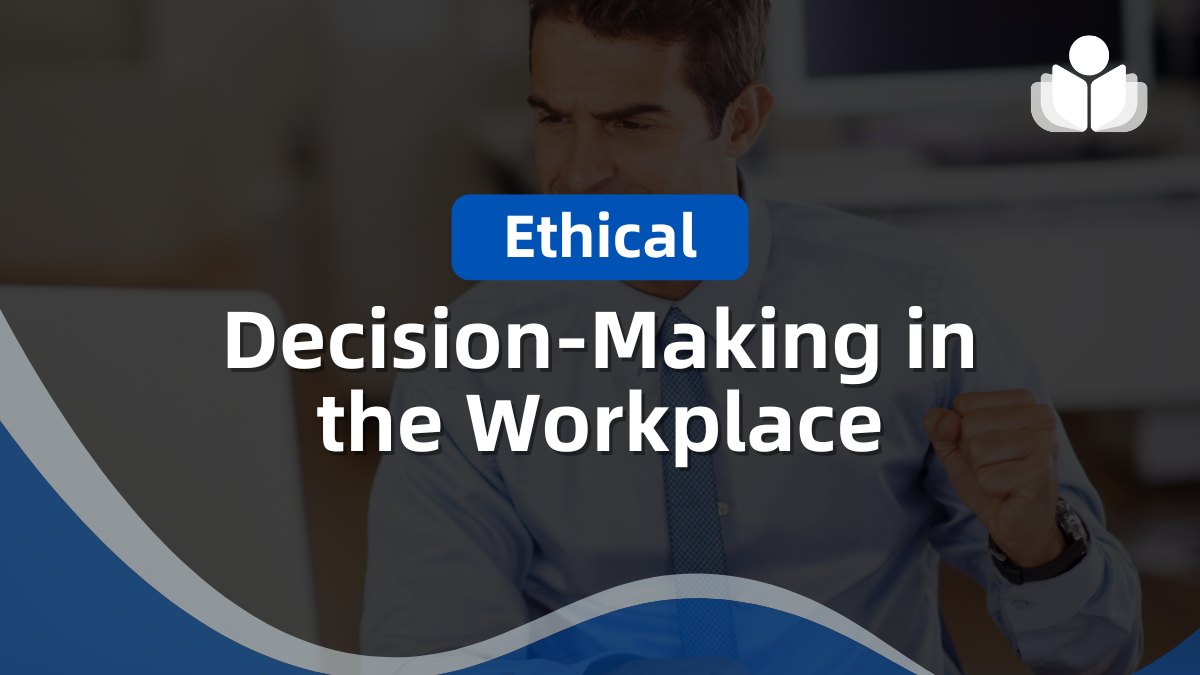Ethical decision-making is evaluating choices based on moral principles, values, and established standards of conduct. In the workplace, it involves choosing actions that uphold integrity, fairness, and accountability, promoting trust among colleagues, clients, and stakeholders. Ethical decisions form the backbone of positive workplace relationships, encouraging respect and transparency.
Ethics play a central role in creating a trusted and accountable work environment. Employees who adhere to ethical standards contribute to a fair and responsible organization, reinforcing its reputation and long-term success. Ethical behavior cultivates a supportive culture, making the workplace a reliable and respectful space.
This guide explores the significance of ethical decision-making in professional settings, offering strategies for making morally sound choices. Employees support organizational goals, enhance their well-being, and build a more robust, cohesive work culture through ethical actions.
Understanding Workplace Ethics
Workplace ethics encompass values and principles that guide employee behavior, promoting accountability, respect, and integrity. Ethical standards contribute to a positive culture where fairness and trust are paramount, ultimately strengthening the organization’s credibility and reputation.
Common Ethical Principles in the Workplace
- Integrity: Acting with honesty and transparency in all situations
- Accountability: Taking ownership of actions and decisions
- Respect: Treating others with dignity and understanding
- Fairness: Ensuring equal treatment and avoiding bias
- Compassion: Considering the impact of decisions on others’ well-being
Ethical Dilemmas in the Workplace
Ethical dilemmas often arise involving conflicts of interest, confidentiality, or resource allocation. Addressing these dilemmas requires clear guidelines and a shared understanding of moral principles to navigate challenging choices effectively.
Having established ethical standards helps employees make decisions that align with organizational values and uphold a trustworthy workplace.
Role of Personal and Organizational Values in Ethical Decision-Making
Personal Values and Their Influence on Decision-Making
Personal beliefs and morals play a significant role in how individuals make decisions in the workplace. Self-awareness is crucial, as understanding one’s values helps employees make choices that align with their principles, supporting a consistent approach to ethical behavior.
Organizational Values and Ethical Standards
Company values and codes of conduct provide a framework for ethical decision-making. Clearly defined values and ethical guidelines set expectations for behavior, guiding employees in upholding the organization’s standards and fostering a unified approach to ethics.
Personal and Organizational Values
Employees find it easier to maintain consistent ethical behavior when personal and organizational values are aligned. Misalignment, however, can create internal conflicts, leading to moral dilemmas.
Organizations benefit from cultivating a culture that resonates with employees’ values, encouraging ethical decisions, and supporting personal integrity and organizational success.
Frameworks for Ethical Decision-Making
Utilitarian Approach
The utilitarian approach bases decisions on maximizing benefits for the most significant number of people. By focusing on outcomes, this framework helps prioritize collective welfare, often guiding resource allocation and team management decisions.
However, it may sometimes overlook minority interests, leading to ethical concerns if individual rights are compromised for the majority’s benefit.
Rights-Based Approach
The rights-based approach prioritizes respecting and protecting the rights of all individuals involved. This includes rights like privacy, freedom of expression, and fair treatment. By ensuring these rights, the framework emphasizes protecting personal integrity and autonomy.
While this approach strongly supports individual rights, it can occasionally conflict with broader organizational goals if not balanced carefully.
Justice or Fairness Approach
The justice or fairness approach centers on impartiality and equitable treatment in decision-making. This framework is handy for conflict resolution and fair resource distribution, promoting equality and justice within the workplace.
However, applying this approach can be challenging when multiple stakeholders have competing claims.
Ethics Approach
Virtue ethics focuses on making decisions based on character virtues, such as integrity, honesty, and compassion. This approach encourages decisions that align with core values, fostering a culture of integrity and moral character. While virtues provide a solid ethical foundation, this approach can be subjective if personal virtues vary widely among employees.
Applying the Frameworks in Combination
In practice, combining these frameworks can help balance ethical considerations. Choosing the most relevant framework based on the situation ensures a balanced approach, addressing outcomes, rights, fairness, and moral values for more comprehensive decision-making.
Ethical Decision-Making Process
Identifying the Ethical Issue
The first step in ethical decision-making is recognizing situations that present ethical challenges. Early identification of moral concerns, such as conflicts of interest or fairness issues, helps prevent problems from escalating. Self-awareness and clarity around organizational values can make it easier to spot potential ethical dilemmas.
Gathering Information and Analyzing Options
Gathering all relevant information provides a complete understanding of each option’s impact. Consulting different perspectives, such as team members or affected parties, ensures informed decision-making. This analysis phase is crucial for thoroughly evaluating potential outcomes.
Alternatives Using Ethical Frameworks
Once options are clear, applying ethical frameworks like utilitarianism, rights-based, or fairness approaches can help weigh the pros and cons of each alternative. These frameworks allow decision-makers to assess each option’s ethical alignment and balance outcomes, individual rights, fairness, and virtues.
Making the Decision and Taking Responsibility
After evaluating alternatives, choosing the option that best aligns with ethical standards and organizational values is key. Taking responsibility for the choice, following through, and being accountable shows a commitment to ethics in action.
Reflecting on the Outcome and Learning
Reflection is a vital part of ethical decision-making. It enables individuals to assess the decision’s impact and gain insights for future scenarios. Regular reflection improves judgment, contributing to stronger ethical decision-making skills over time.
Role of Leadership in Promoting Ethical Decision-Making
Leaders play a crucial role in setting ethical standards through their actions. Modeling ethical behavior reinforces the organization’s commitment to integrity, showing employees that ethical conduct is expected at all levels.
Open Communication and Transparency
Creating a culture of openness encourages employees to discuss ethical issues without fear of retaliation. Transparency from leadership fosters trust, making employees feel more comfortable raising ethical concerns and seeking guidance.
Ethical Training and Resources
Ethics training equips employees with tools for handling ethical dilemmas effectively. Resources like codes of conduct, anonymous hotlines, and mentorship further support ethical decision-making by providing guidance and support when challenges arise.
Recognizing and Rewarding Ethical Behavior
Acknowledging and rewarding ethical behavior motivates employees to prioritize integrity. Positive reinforcement, such as recognition or rewards, helps establish a culture where moral decisions are valued, contributing to long-term organizational accountability.
Ethical Challenges in the Workplace and How to Address Them
Conflicts of Interest
Conflicts of interest, such as favoritism, nepotism, or personal gain, can compromise trust and fairness in the workplace. Transparency is essential to managing these conflicts. Employees should disclose any personal connections or financial interests that may affect decision-making.
Organizations can establish clear policies to prevent conflicts and ensure decisions are based on merit rather than personal biases.
Confidential Information
Confidentiality is crucial for maintaining trust, particularly when handling sensitive information. Organizations can implement access control to prevent breaches, where only authorized personnel handle confidential data.
Policies should also reinforce a “need-to-know” approach, limiting access to information based on role requirements. Regular reminders about the importance of confidentiality help foster a culture of trust and professionalism.
Fairness in Resource Allocation and Decision-Making
Ensuring fairness in access to resources, opportunities, and promotions is essential for a positive workplace. Fairness can be maintained using objective, transparent resource allocation and decision-making criteria. Providing employees with straightforward explanations about the rationale behind these decisions helps build trust and minimizes perceptions of bias.
Whistleblowing and Reporting Misconduct
Employees may face challenges when reporting unethical behavior, fearing retaliation or isolation. Providing anonymous channels like hotlines allows employees to report concerns safely. Organizations should have policies to protect whistleblowers from retaliation, fostering an environment where ethical issues can be openly addressed without fear.
Impact of Ethical Decision-Making on Workplace Culture and Reputation
Building Trust and Credibility
Ethical decision-making is fundamental for building trust among employees, clients, and stakeholders. When an organization prioritizes ethics, it fosters a culture of honesty and reliability, enhancing teamwork and loyalty. Trust encourages open collaboration and strengthens bonds within the organization.
Improving Employee Morale and Engagement
A culture of integrity positively affects employee morale and engagement. Employees knowing they are part of an ethical workplace enhances their satisfaction and motivation, leading to a more supportive and energized work environment.
Reputation and Customer Loyalty
An organization’s public image is closely tied to its ethical practices. Ethical conduct attracts clients, investors, and partners who value responsible practices. These relationships build customer loyalty and contribute to a reputable brand identity.
Risk Mitigation and Long-Term Success
Ethical decision-making reduces legal issues, conflicts, and reputational damage risks. A proactive approach to ethics creates a stable foundation for long-term growth, ensuring the organization remains resilient in facing challenges while building sustainable success.
Tools and Resources for Supporting Ethical Decision-Making
Codes of Conduct and Ethical Guidelines
A clear code of conduct is a reference point for employees, outlining expected behaviors and guiding principles. These guidelines provide a roadmap for ethical decision-making and ensure consistency across the organization.
Ethics Training Programs
Regular ethics training reinforces standards and problem-solving skills, including workshops and e-learning modules. Training helps employees handle ethical dilemmas effectively, aligning them with the organization’s values.
Ethics Committees and Ombuds Programs
Ethics committees offer guidance on complex ethical issues, helping employees navigate challenging situations. Ombuds programs provide confidential support for reporting and mediating ethical concerns, promoting a safe space for ethical discussions.
Utilizing Technology and Ethics Hotlines
Anonymous hotlines and digital reporting tools allow employees to raise concerns securely. These technologies enhance transparency, confidentiality, and accountability, making ethical resources more accessible and reliable.
Conclusion
Ethical decision-making, guided by integrity, fairness, and compassion, positively impacts workplace culture and organizational success. Employees and organizations can navigate ethical issues by using frameworks, addressing common challenges, and leveraging resources.
Ethics are a core element of professional conduct and decision-making. Prioritizing ethical practices strengthens both personal growth and organizational culture. Ethical decision-making is an ongoing skill that enhances trust, reputation, and resilience, laying the foundation for long-term success and a supportive workplace.
 Sections of this topic
Sections of this topic
















